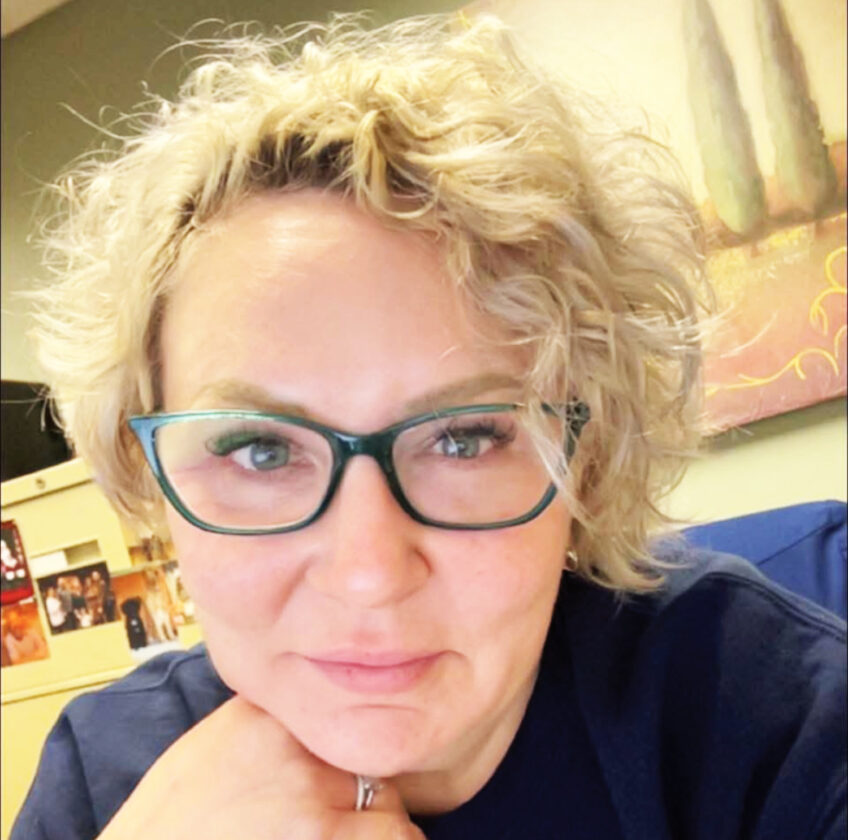‘Fight like hell’
‘Fight like hell’

Submitted photo Anna Rager, 49, was diagnosed with a rare form of breast cancer earlier this year. The Howland resident has split treatment between Cleveland and Houston.
Anna Rager, 49, of Howland, is a wife, a mother, a grandmother to a 4-year-old little girl and has a grandson due before Thanksgiving. She is a registered nurse / cardiac coordinator at St. Joseph’s in Warren. She is also immersed in the battle of a lifetime with breast cancer.
Her story begins in February 2025 when she noticed her left breast was swollen and felt a little bit hard. The nipple was inverted. Suspecting an infection, she went to urgent care. The physician’s assistant there thought she had mastitis and prescribed an antibiotic. He cautioned her to go to the ER if it did not get better in a week.
She intuited that something was not right and so made an appointment with her gynecologist who admitted to being perplexed by her symptoms. She had an ultrasound done and it was determined that there was a mass, but was told, “It isn’t a typical cancer mass.” She continued with the antibiotics — still no improvement. A biopsy was done on the mass in her breast and in a lymph node under her arm.
“I got the results and it came back as invasive ductile carcinoma in both my breast and my lymph node,” Rager recalled. “That made me at least stage II.”
She decided to seek treatment at the Cleveland Clinic Taussig Cancer Center, where she was diagnosed with inflammatory breast cancer. IBC is a rare form of breast cancer, accounting for usually only about 2% to 4% of breast cancers. IBC is initially diagnosed as stage III because it involves the ducts, the lymph nodes and the skin. It is diagnosed mainly by clinical diagnosis — a rapid onset of symptoms, redness, swelling, skin thickening / peau d’orange (the skin looks like an orange peel) and warmth in the breast. A PET scan in April revealed some spots on her spine, confirming Stage IV breast cancer.
Her oncologist at the Cleveland Clinic decided to start her on hormonal and targeted therapies rather than chemotherapy. Since the therapies would be suppressing her estrogen, she went into medically-induced menopause.
“Every three months I get a shot called Zoladex, I take a daily Letrozole pill (the hormonal therapy) and I also take a pill called Ibrance which is a CDK4/6 inhibitor (targeted therapy),” she said.
CDK4/6 inhibitors are a class of medicines used to treat certain types of hormone receptor-positive, HER2-negative breast cancer. These medicines interrupt the process through which breast cancer cells divide and multiply. To do this, they target specific proteins known as the cyclin-dependent kinases 4 and 6, abbreviated as CDK4/6.
“I was told by the breast surgeon at Cleveland Clinic that I was not a candidate for a mastectomy, so I decided to seek a second opinion at MD Anderson Cancer Center in Houston, Texas,” Rager said. “MD Anderson is not only the top cancer hospital in the United States, but they have the best IBC program as well.”
After getting scans at MD Anderson at the end of July and meeting with the medical oncologist, the breast surgeon and the radiation oncologist there, she was informed that her PET scan showed complete metabolic response. It meant the hormone and targeted therapies were working.
“In the world of IBC, this is not common, especially after such a short time on treatment,” Rager said.
She continued, “The breast surgeon at MD Anderson, Dr. Anthony Lucci (who has possibly done the most IBC surgeries in the United States), said I should continue my therapies. I will return to Houston in mid-October for more scans. If my treatment continues to work, I am tentatively scheduled for a mastectomy of my left breast on Oct. 30 of this year at MD Anderson in Houston followed by radiation, which I will have done in Cleveland. Dr. Lucci believes that if all goes according to plan, I would have a 5% chance or less of recurrence. That would be a miracle!”
When asked how she was coping with all this, she said, “I try to be positive, but there was a point in time in late spring / early summer where I wrote my own obituary. But I have an incredible support system. My husband is an angel. He works 10-plus hour days and comes home and cooks me a nutritious dinner every night using the guidelines given to us by a nutritionist. I am blessed beyond measure with my daughter and friends who are putting a benefit on for us at the beginning of October to relieve some of the burden of travel expenses to Houston and in preparation for me being off of work for two months with surgery and radiation.
“I try to live every day as if everything was normal. I still babysit my granddaughter as much as I can. I try to make time to spend with family and friends. I have a job that I love, so I still try to go to work every day.
“Physically, I am fatigued most of the time. Mentally, I’ve learned to come to terms with what’s going on with me. Emotionally, well, that wavers. My hormones have made me a huge crybaby now though,” she laughed. “But no matter what my scans say in October, I’m still going to fight like hell.”

